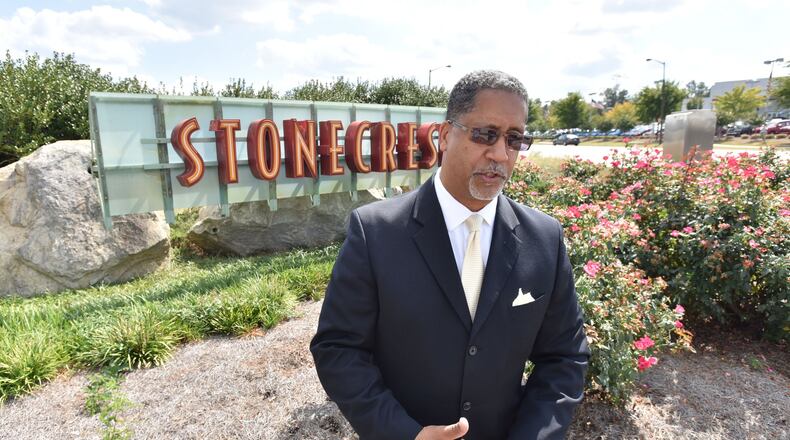About Stonecrest
Population: About 50,000
Geography: Southeast DeKalb, covering 30 square miles adjacent to Lithonia and Stonecrest Mall
Services: Code enforcement, planning and zoning, and parks and recreation. Police could be added later.
Drivers zipping along I-20 through southwest DeKalb County pass empty retail stores, overgrown lots and plenty of undeveloped land.
Right now, there's little reason to stop. But that's what supporters of the proposed city of Stonecrest hope to change.
They envision a new city that will promote business growth, attracting companies and creating jobs. Whether voters also buy into that vision will be determined Nov. 8, when potential residents of the city of Stonecrest go to the polls to decide whether to incorporate.
Stonecrest would be made up of more than 50,000 people over nearly 30 square miles. The city would include Stonecrest Mall, industrial areas and residential subdivisions located near the existing city of Lithonia.
“It’s long overdue. We need something that’s going to accelerate progress in this area,” said Michelle Emanuel, one of the city effort’s supporters. “Stonecrest is an undiscovered gem, and we know about it, but nobody is promoting us. We need to do it ourselves.”
Stonecrest would model itself after other nascent cities that have started with small governments that outsource most functions. If approved, Stonecrest would provide three basic services: code enforcement, planning and zoning, and parks and recreation, though a police force also could be added. The rest of local government would continue to be handled by DeKalb County.
What sets Stonecrest apart is the idea that its new government would concentrate its efforts on bringing in businesses.
"Our No. 1 reason for becoming a city is economic development," said Jason Lary, the president of Stonecrest Yes. "Who's out there branding and marketing our area? Nobody. If we don't do it, it stays like this. We won't have economic development and a business focus. That's unacceptable."
While market forces often drive business decisions, Lary said a city government could help.
An economic development department could market the city and recruit businesses. A city permitting department could be faster than the county's. Local code enforcement officers could remove trash and blighted properties.
In addition, businesses could band together and tax themselves, forming a community improvement district to pay for additional services like lawn mowing and security services.
DeKalb Commissioner Mereda Davis Johnson, whose district covers the Stonecrest area, isn’t convinced the city would do a better job than the county.
She said the cityhood formula that worked in more developed areas of the county, like Brookhaven and Dunwoody, won’t necessarily deliver the same results in Stonecrest.
For two years, residents of the area didn’t have representation on the county commission, leaving many feeling underserved, Johnson said. But that changed in July 2015 when she took office. Southeast DeKalb didn’t have a county commissioner after Lee May was appointed by Gov. Nathan Deal in July 2013 to serve as DeKalb’s interim CEO, replacing Burrell Ellis as he faced criminal charges.
“I can understand some of the frustration, but I think we’re moving in the right direction,” she said. “There’s no need to reinvent the wheel when you already have one that’s rolling.”
The region was neglected when it didn’t have political representation, but that crisis is over, said Genet Hopewell, an attorney who works with Johnson.
“I see the city of Stonecrest as abandoning the good foundation we have and starting something new,” Hopewell said. “If you’re going to create a city, you’d have to make it function more responsively than what we have now.”
Cityhood proponents say Stonecrest’s government would be more involved than the county. Each of five city council members would represent about 10,000 people, instead of one county commissioner representing more than 140,000 residents.
City services would be paid through existing property taxes, and those taxes wouldn't increase, Lary said. A feasibility study conducted by the University of Georgia said that Stonecrest would have annual revenue of about $10 million and expenses of $8 million.
J.P. Singh, the chairman of the Stonecrest Business Alliance, said he supports the incorporation proposal because the county government hasn’t given the area the attention it needs.
While many other communities have fully recovered from the recession, Stonecrest hasn’t seen the same prosperity, he said.
“Residents and businesses are getting left behind,” said Singh, the chief development officer for Duke Hospitality, a hotel management company. “All it takes is a focused effort, and the vision could be realized.”
About the Author
Keep Reading
The Latest
Featured




